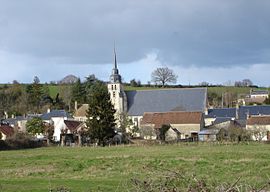Sougé, Loir-et-Cher
Sougé | |
|---|---|
Commune | |
 | |
| Coordinates: 47°46′16″N 0°43′43″E / 47.7711°N 0.7286°E | |
| Country | France |
| Region | Centre-Val de Loire |
| Department | Loir-et-Cher |
| Arrondissement | Vendôme |
| Canton | Le Perche |
| Intercommunality | CA Territoires Vendômois |
| Government | |
| • Mayor (2020–2026) | Bernard Bonhomme[1] |
Area 1 | 16.88 km2 (6.52 sq mi) |
| Population (2022)[2] | 478 |
| • Density | 28/km2 (73/sq mi) |
| Time zone | UTC+01:00 (CET) |
| • Summer (DST) | UTC+02:00 (CEST) |
| INSEE/Postal code | 41250 /41800 |
| Elevation | 56–147 m (184–482 ft) (avg. 62 m or 203 ft) |
| 1 French Land Register data, which excludes lakes, ponds, glaciers > 1 km2 (0.386 sq mi or 247 acres) and river estuaries. | |
Sougé, also known as Sougé-sur-Braye (French pronunciation: [suʒe syʁ bʁɛ]) for disambiguation, is a commune in the French department of Loir-et-Cher, Centre-Val de Loire region, France.
History
In the time of the Romans, Sougé had a special importance because of his Roman's camp, called "Camp of Cesar" in the country. Today the fortifications are not visible any longer, but they were visible in the last century.
Geography
Sougé is a village in the department of Loir-et-Cher, situated on the river Loir. The village of Sougé is near the village of Couture-sur-Loir (the village of Pierre de Ronsard) and the town of Montoire-sur-le-Loir. The nearest town of more than 40,000 inhabitants is Tours.
Name
Sougé was called Silviacus (3rd and 8th century), then Selgiacus (11th century), Sugeium in 1216, Sougeium in the 13th century, paroisse des Roches de Sougé in 1595, Sougé-sur-Loir in 1675, Sougé-sur-Braye after the French Revolution, and now Sougé.
Population
| Year | Pop. | ±% p.a. |
|---|---|---|
| 1968 | 570 | — |
| 1975 | 518 | −1.36% |
| 1982 | 493 | −0.70% |
| 1990 | 462 | −0.81% |
| 1999 | 437 | −0.62% |
| 2007 | 475 | +1.05% |
| 2012 | 478 | +0.13% |
| 2017 | 479 | +0.04% |
| Source: INSEE[3] | ||
Sights
The spacious church of St. Quintin has a barrel-vaulted roof and early twentieth century glass depicting amongst other themes Pope Leo XIII. There are traces of Renaissance architecture along the main (and almost only) street. The village cemetery contains Commonwealth graves.
See also
References
- ^ "Répertoire national des élus: les maires". data.gouv.fr, Plateforme ouverte des données publiques françaises (in French). 2 December 2020.
- ^ "Populations de référence 2022" (in French). The National Institute of Statistics and Economic Studies. 19 December 2024.
- ^ Population en historique depuis 1968, INSEE
External links




